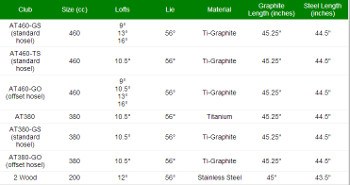![]()

Shaft Torque Specification
Golf clubs are composed of many different parts, each with their own unique specifications that affect the club's performance. One of these specifications is the shaft torque. In this article, we will explore what shaft torque is and why it is important in golf.
Definition of Shaft Torque
- Shaft torque refers to the amount of twisting a golf club shaft experiences during the swing.
- It is measured in degrees and indicates the resistance of the shaft to twisting forces.
- A low torque rating means the shaft has less twisting, while a high torque rating indicates more twisting.
Why Shaft Torque Matters
Shaft torque directly influences the performance of a golf club. Here are a few reasons why it matters:
- Accuracy: Shaft torque affects the club's accuracy by influencing the face angle at impact. A higher torque can cause the face to be more open or closed, leading to off-center hits and less accuracy.
- Consistency: Golfers require consistency in their swings to improve. An inconsistent shaft torque can lead to inconsistent shot patterns and make it difficult to develop a repeatable swing.
- Flex: Shaft torque is closely related to the flex of a golf club. A higher torque usually means a softer overall flex. So, understanding the torque of a shaft helps golfers select the appropriate flex for their swing speed and style.
- Feel: The feel of a club is crucial for golfers. Shaft torque plays a role in how a club feels during the swing. Some golfers prefer a stiffer shaft with less torque, while others prefer a softer shaft with more torque.
Choosing the Right Shaft Torque
Choosing the right shaft torque is essential for optimizing your golf performance. Here are a few factors to consider:
- Skill level: Higher torque shafts are generally more forgiving, making them suitable for beginners or those with slower swing speeds. Lower torque shafts are recommended for advanced players who have better control over their swings.
- Swing tempo: Faster swing tempos may require lower torque to prevent excessive twisting and maintain accuracy.
- Conditions: Playing in windy or adverse weather conditions may require more stable and lower torque shafts to handle the added forces.
- Personal preference: Ultimately, personal preference plays a significant role in selecting the right shaft torque. Trying out different shaft torque options and assessing how they feel and perform during practice sessions or rounds can help golfers determine their preference.
Conclusion
Understanding the concept of shaft torque and its importance in golf can assist golfers in making informed decisions about their club selection. Keep in mind that torque specifications can vary across different golf club brands and models, so it is essential to consult with a professional club fitter or golf instructor to find the perfect shaft torque for your game.





